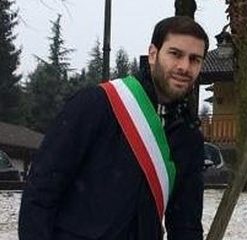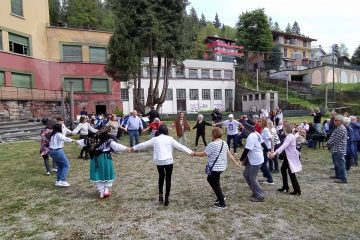Haim Raphael, Holocaust lecturer and delicatessen owner, dies at 90
Born in Thessaloniki, Greece, Raphael was the only member of his family who survived Auschwitz. He became well-known for his Holocaust lectures to teens, students and soldiers.
 |
 |
The death notice for Haim Raphael, published in the interim days of Passover, was prominent and unusual. It included the prisoner number that had been tattooed on Raphael’s arm when he was a prisoner in Auschwitz-Birkenau. Above the number on the notice were the words: “Among the best sons of Jewish Thessaloniki.”
Raphael died on Passover eve, aged 90. He had become well-known for his lectures to teens, university students and soldiers about the Holocaust, and as the owner of the Raphael delicatessen in the Levinsky Market, south Tel Aviv.
Raphael was born in Thessaloniki, Greece, in 1924, into what he called a “warm Jewish-religious home.” His parents, Tzadik and Sultana, owned a flower shop in the city. “We were not considered a wealthy family, but we had means,” he once said. “There was much poverty in the city, but they taught us that to be Jewish was a thing of pride. Father would say in Spanish, ‘Not everyone in this world has the privilege of being born Jewish,” Raphael added.
Raphael was the only member of his family to survive the Holocaust. “They all went to the ovens, and I remained alone … you can’t run away from Judaism: With pain, without pain, with curses, with blows, but you can’t run away from being born a Jew. No way. I was born a Jew and with pride I will die a Jew,” he said at his lectures.
When the Nazis invaded Greece in April, 1941, “I felt it was a black day, as if I knew something terrible was about to happen,” he later recalled. In the summer of 1942, Raphael said, he was among the Jews made to congregate in Elefterias (“Freedom”) Square in central Thessaloniki, where they were abused and humiliated by the Germans. “A German officer came out … and put me in the middle. At first, I was made to do some sort of athletics. Then they started beating me and kicking me. I got to the point where I felt nothing. I was lying there, I had no strength to get up … they tore my clothes, they made me a rag,” he said.
In the spring of 1943, Raphael and his family were sent to the Baron Hirsch ghetto in Thessaloniki, and from there they were deported to Auschwitz. “I don’t know whether anyone can describe the suffering of the eight days in the train cars. I don’t know if anyone can describe that atmosphere for seven days and eight nights. They would put 80 people and more in the cars, it was terrible: the suffering, the humiliation,” he recalled.
Raphael discussed one horrific incident he remembered from the journey to Auschwitz. “There was a doctor with us in the car who was afraid he would get lice. We were there for days on end without washing, without seeing water, with nothing. And the doctor would sit by himself and I asked him several times, ‘Doctor, how many days can a person live without food? How long can a person hold on?’ He answered, ‘One can hold on for 40 days.’ Every morning I would remind him: ‘Doctor, how many days’ And the doctor would answer: ’40 days.’ On the seventh day I said, ‘Doctor?’ The doctor was dead. ‘Doctor,’ I said to him, ‘are you gone? Why so quickly? You said a person could live for 40 days without food.’”
In Auschwitz, the accordion he had brought with him from Thessaloniki was taken away from him, as he was beaten and screamed at. “I cried like I cried when they took my sisters away, because I thought a person who doesn’t play music cannot be happy in this world,” Raphael recounted.
His love for music began when he was a child: “My mother would sing as she did the housework. My sister Rivka especially loved to hum Greek operettas and Ladino songs,” he wrote in his 1997 book “Song of Life.” As a child he was a choirboy in the Beit Shaul Synagogue in Thessaloniki.
Raphael never saw his accordion again, but from time to time he played an instrument that SS officers gave him to play for them. Once, when he saw an SS man trying unsuccessfully to play a harmonica, he went up to the officer and asked for it. “He gave it to me and I played ‘Lili Marlene.’ While I was playing, they were beating my father, and so I stopped. The officer asked me why I had stopped and I told him they were beating my father. He immediately ordered that they stop. My father couldn’t believe the miracle that had happened to him,” Raphael related.
After the Holocaust, when Raphael came to Israel, he established a choir of survivors from Greece. In 1979, they appeared before President Yitzhak Navon at the President’s Residence. “Here we are, refugees from that inferno, invited to sing at the President’s Residence,” he recalled.
Raphael’s sisters and brothers were killed when they arrived at Auschwitz. His father (also called Haim) and little brother David were sent to forced labor, and only he survived. In April 1944, he was transferred to “Kanada Kommando,” a group of prisoners whose job was to unpack the goods of the Jews who had arrived at Auschwitz on the trains. “Dozens of transports arrived at the time from Hungary, and the moment they arrived, most were sent to the ovens. I worked at that death factory,” he said.
“The terrible job imposed on me was to bring off the train, quickly and ‘efficiently,’ those who had arrived from across Europe. It was a hard job, especially because we, the ‘camp veterans,’ knew what was waiting for those who had just arrived in hell … The sights I saw are hard to describe. At night, when I am with myself, the voices and the fearful sights come back. How can I describe the heartbreaking sights of babies torn from their mothers? How can I explain here the ear-shattering screams?”
In Haya Ostrover’s book “If Not For Humor, We Would Have Committed Suicide” (2009, Yad Vashem), Raphael said: “There was a capo who wanted us to march like soldiers and sing marching songs, left-right, and another song and another. We didn’t have any other songs. How many marching songs were there in Greece? There was one song about people complaining and wanting money. With those songs, with those tunes, we would curse them and sing all sorts of foolishness: ‘Don’t worry folks, we’ll get out of here, you’ll see.’ And they, the capos, were pleased. And we sang ‘We hope you burn,’ in Greek and in Spanish,” he related.
In January 1945, Raphael was sent on a death march to other camps. He was in Flossenbürg, Ohrdruf and Buchenwald. At his last stop, Theresienstadt, he met his future wife.
“I suddenly heard the quiet voice of a young girl, calling out the word ‘Grecos’ – which means Greeks. She was looking for someone from Greece or someone who spoke Greek. I came closer to the voice and I saw a little hand reaching out to me. I came closer and she asked me right away if I knew anything about Greeks from Corfu. I saw the bitter disappointment and sadness in her eyes. I was full of pity for this miserable girl. That girl – her name was Esther – was looking for her father and wanted to find out from Greek-speakers something about what happened to him,” Raphael said.
Later, love blossomed between Esther and Haim. Together they went back to Thessaloniki, where they married. “And then I heard someone say we could go to Palestine. I was among the first to sign up and said: ‘I’m with these people. After we saw what happened to us, I don’t want to live here.’”
In June 1946, they came to Israel on the illegal immigrant ship Haviva Reik. “With no family, no profession, no language, nothing, nothing at all,” he said. He served in the army and later worked as a porter and a merchant.
In 1958, he and Esther opened a grocery store in Levinsky Market, which eventually became a culinary mainstay there under the name Haim Raphael Delicatessen in Levinsky. “I was in my 30s,” he recalled. “We had a lot of energy and quite a lot of ambition. We worked for hours, from morning to night.” Among his clients were fine restaurants in Tel Aviv and Jaffa, as well as journalists and writers – among them Amos Kenan, Haim Gouri and Menachem Talmi.
In 1992, on the 500th anniversary of the Jewish expulsion from Spain, Raphael lit a torch on Independence Day eve, on Mount Herzl.
Raphael is survived by three children and 10 grandchildren. One son, Tzadik, manages the deli; his daughter Simcha, is a retired teacher; and his other son, Prof. Samuel Raphael, is head of the Ladino Department at Bar-Ilan University, Ramat Gan.





